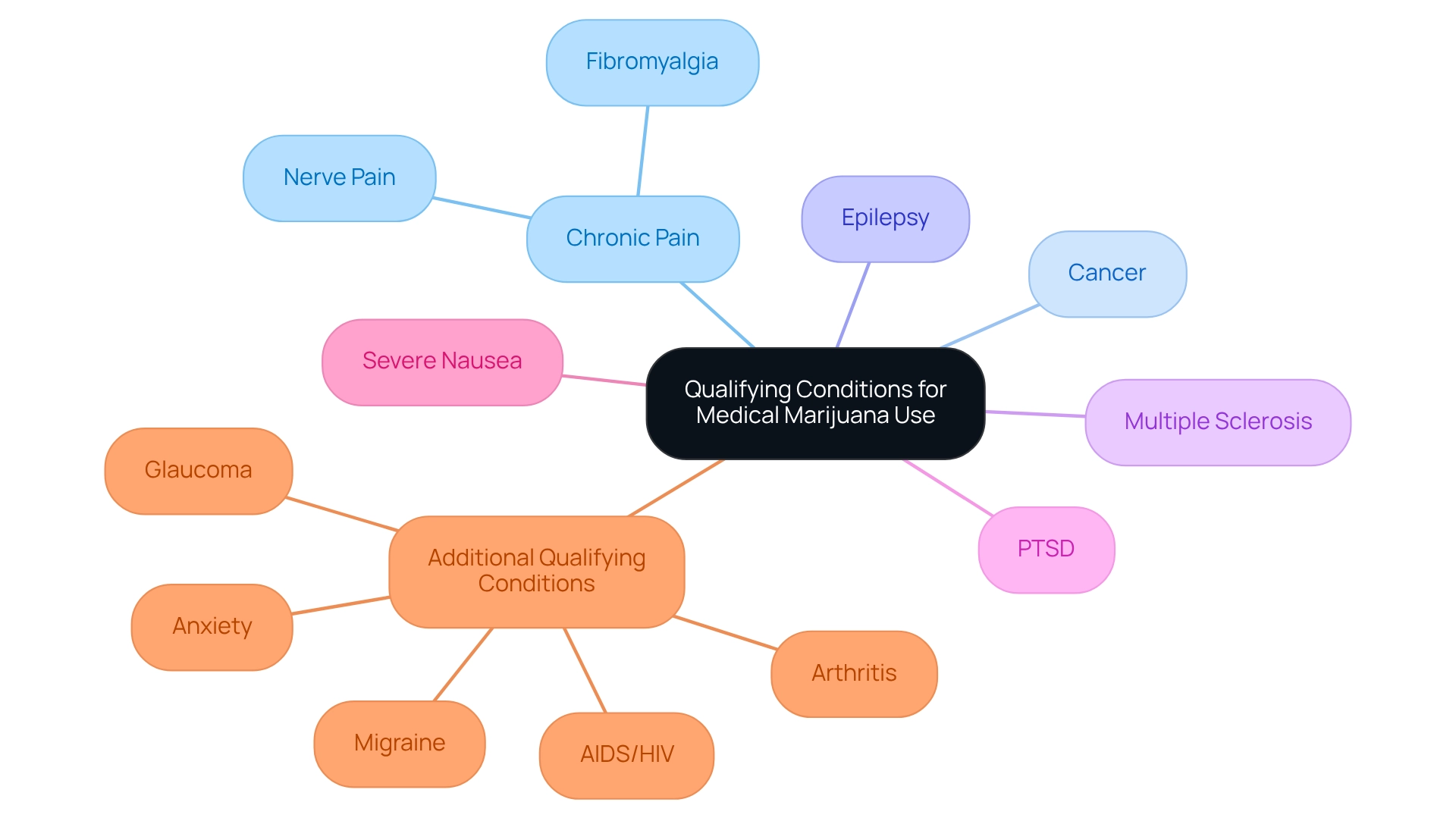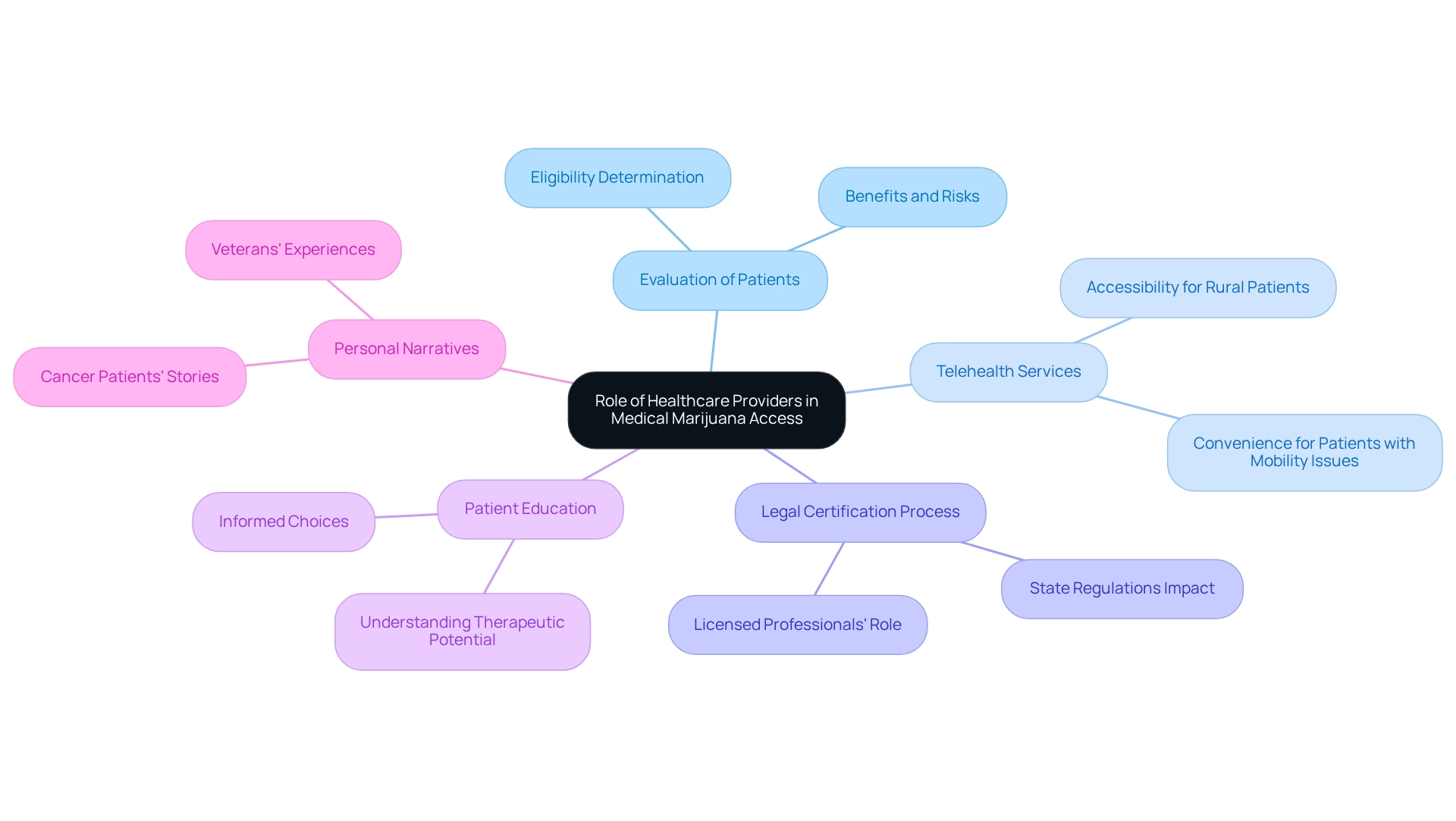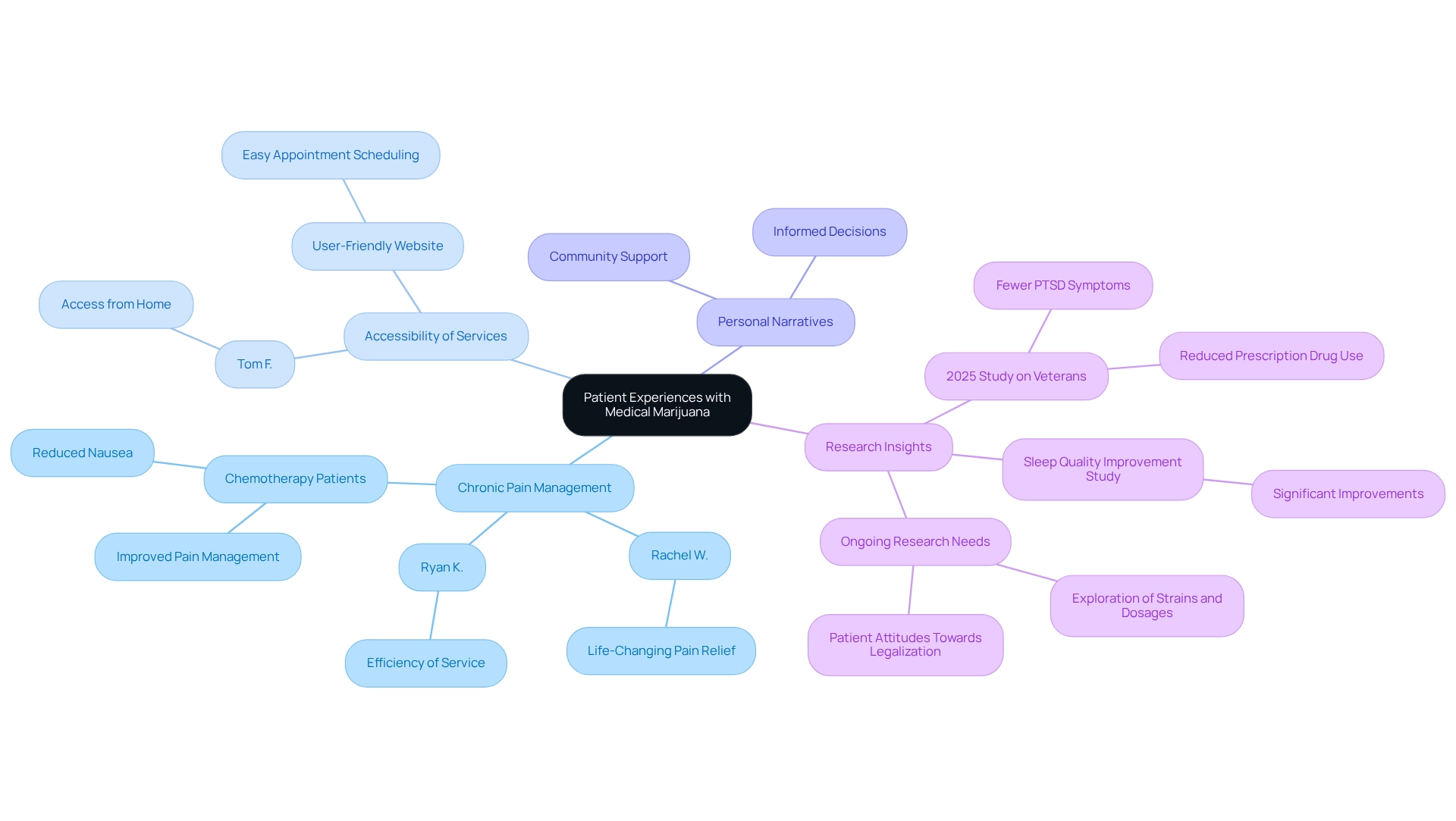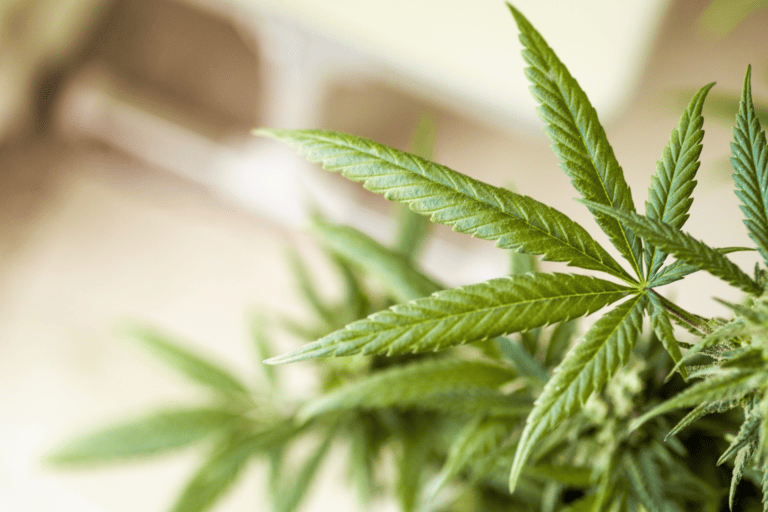Understanding Medical Marijuana States: An In-Depth Tutorial for Patients
by Maya Green · April 4, 2025
Explore the evolving landscape of medical marijuana states and patient access in this insightful guide.

Overview
This article delves into the compassionate role of medical marijuana in patient care, especially in states where its therapeutic use is legalized. It’s important to acknowledge the struggles many patients face with chronic pain, anxiety, and other health conditions. Medical cannabis has been shown to alleviate these symptoms, with numerous patient testimonials and research highlighting significant improvements in quality of life for users. You may find that understanding these benefits can empower you in your healthcare journey.
Navigating state regulations and involving healthcare providers is crucial in this process. It’s essential to remember that you are not alone; many have walked this path and found relief. By fostering open communication with your healthcare team, you can explore the options available to you. Together, you can create a plan that addresses your unique needs, ensuring you feel supported every step of the way.
In conclusion, the journey towards improved health through medical marijuana is one that requires understanding and compassion. As you consider this option, take the time to reflect on your experiences and discuss them with your provider. You deserve to find the relief that works for you, and with the right support, it is possible to enhance your quality of life.
Introduction
In recent years, medical marijuana has emerged as a significant player in patient care, offering alternative treatment options for various chronic conditions. It’s important to recognize the challenges you may face as you seek relief. With its roots in the cannabis plant, medical marijuana is rich in cannabinoids that have been shown to alleviate symptoms such as chronic pain, anxiety, and nausea, providing comfort where traditional medications may fall short. As more individuals explore this natural remedy, the integration of medical marijuana into treatment plans has sparked a growing body of research highlighting its potential to enhance quality of life.
However, navigating the complexities of eligibility, state regulations, and the application process can be daunting. You may find that understanding these aspects is crucial in your journey toward better health. This article delves into the multifaceted role of medical marijuana in patient care, exploring its benefits, risks, and the vital support systems that empower you to make informed decisions about your health. Together, we can explore these options and find a path that feels right for you.
The Role of Medical Marijuana in Patient Care
Therapeutic cannabis has emerged as a vital component in healthcare, presenting alternative treatment options for various health concerns. Extracted from the cannabis plant, it contains cannabinoids that can help alleviate symptoms like chronic pain, nausea, anxiety, and even enhance sleep quality. Many individuals turn to therapeutic cannabis when traditional treatments fall short or when they wish to avoid the adverse side effects often associated with pharmaceuticals.
Incorporating cannabis into treatment plans has been shown to significantly improve the quality of life for those grappling with chronic illnesses. Recent studies indicate that individuals using cannabis for therapeutic purposes report meaningful improvements in both physical and mental health. For instance, improvements in bodily discomfort and physical roles were observed consistently throughout a comprehensive examination of outcomes.
It’s noteworthy that the mean daily THC dose increased from 6.5 mg to 25.8 mg over time, correlating with enhanced patient-reported outcomes.
Telehealth services have revolutionized access to therapeutic cannabis, allowing patients to connect with licensed healthcare professionals from the comfort of their homes. This is particularly beneficial for individuals facing mobility challenges or those residing in rural areas, ensuring they receive the necessary guidance on the safe and effective use of cannabis. Leafy DOC exemplifies this approach by simplifying the process of obtaining cannabis cards, with many applications processed within 24-48 hours, thus facilitating timely access to treatment.
Case studies further illustrate the positive impact of therapeutic cannabis on managing chronic pain. For example, one study highlighted that the mean daily THC dose increased significantly over time, aligning with improved patient-reported outcomes. Healthcare professionals consistently underscore the benefits of cannabis, noting its role in enhancing overall care and quality of life.
As Thomas R. Arkell, PhD, from the Centre for Human Psychopharmacology, remarked, “Overall, treatment with therapeutic marijuana was linked to enhancements in all physical and mental health domain scores.” Additionally, many individuals have reported significant relief from anxiety and improvements in sleep quality, showcasing the diverse benefits of therapeutic marijuana.
As the landscape of therapeutic marijuana evolves, its importance in the care of individuals becomes increasingly clear, underscoring the need for ongoing research and education for those receiving treatment. Furthermore, understanding the legal aspects surrounding cannabis is crucial for individuals in medical marijuana states as they navigate this changing landscape. The State Cannabis Policy Enactment Database, supported by the National Conference of State Legislatures, provides up-to-date information on cannabis legislation across all U.S. states and territories, including medical marijuana states, offering essential context for individuals seeking to use therapeutic cannabis safely and effectively.
Qualifying Conditions for Medical Marijuana Use
Patients may qualify for therapeutic cannabis based on specific health conditions recognized by state regulations. Common qualifying conditions include:
- Chronic pain
- Cancer
- Epilepsy
- Multiple sclerosis
- PTSD
- Severe nausea
As of 2025, every medical marijuana state has its own list of qualifying conditions. It’s crucial for individuals to consult their state’s health cannabis program to understand the specific eligibility criteria.
In regions like California and Colorado, wider interpretations enable patients with issues such as anxiety or insomnia to explore marijuana as a viable treatment alternative.
Examples of qualifying conditions for a therapeutic marijuana card include:
- AIDS/HIV
- Anxiety
- Arthritis
- Cancer
- Chronic pain
- Epilepsy
- Glaucoma
- Migraine
- Multiple sclerosis
- Nerve pain
- PTSD
It’s important to remember that while some medical marijuana states accept out-of-state health cards, others do not. Therefore, checking your state page for a complete list is essential.
Statistics indicate that a notable proportion of individuals use therapeutic cannabis primarily for chronic pain relief. Research suggests that around 62% of users of medicinal herb cite chronic pain as their qualifying condition. This underscores the increasing acknowledgment of marijuana as an effective substitute for pain relief.
Real-world instances demonstrate the diverse group of individuals benefiting from cannabis. For instance, one individual suffering from severe chronic pain due to fibromyalgia found substantial relief through medical cannabis, enabling them to reduce their dependence on opioids. Such stories highlight the importance of individualized treatment strategies and the role of healthcare professionals in guiding individuals through the eligibility process.
Consulting with a healthcare provider is vital for patients to navigate these requirements and determine if they meet the necessary criteria. Healthcare experts emphasize the significance of a comprehensive assessment, noting that understanding the intricacies of medical marijuana state regulations and personal health conditions is essential for successful access to therapeutic cannabis. As suggested by the National Academies of Sciences, Engineering, and Medicine, a robust research agenda is crucial to minimize public health harms and enhance the understanding of cannabis’s therapeutic potential.
In summary, the landscape of therapeutic cannabis eligibility is continuously evolving in medical marijuana states, with regulations adapting to new research and consumer needs. By staying informed and seeking advice from certified healthcare experts, individuals can successfully manage the challenges of acquiring cannabis for their eligible conditions. Furthermore, with a total of 2,974,433 individuals reported in 2020, understanding these conditions and the availability of medical cannabis is more important than ever.
Leafy DOC plays a vital role in this process by connecting individuals with licensed healthcare professionals, simplifying the application process, and ensuring that individuals receive the necessary evaluations and certifications. Testimonials from satisfied clients emphasize the effectiveness and compassion of Leafy Doc’s telehealth services, with many expressing gratitude for the support offered during challenging times. One patient noted, “Leafy DOC made everything accessible from home, and I’m so thankful for how easy they made it for me.”
This reflects the transformative impact of Leafy Doc’s services, particularly for those with disabilities or chronic conditions.
Navigating State Laws and Regulations on Medical Marijuana
Navigating the terrain of cannabis regulations can feel overwhelming, especially as laws vary significantly from state to state. Currently, 38 states, along with the District of Columbia, have legalized medical cannabis in various forms, each with its own unique regulations governing possession limits, cultivation rights, and the process for obtaining a medical cannabis card. For many, understanding these nuances is crucial. For instance, California has long been a leader in cannabis consumption, with statistics indicating higher usage rates compared to ten other states during the late 1990s.
It’s important to remember that local regulations can directly impact your access to treatment. Taking the initiative to familiarize yourself with your state’s specific laws is a vital step. Resources such as state health department websites and legal advocacy groups can provide essential information to help you navigate the complexities of cannabis legislation.
You may find that the State Cannabis Policy Enactment Database offers valuable insights into cannabis laws across all 50 states. This resource allows individuals to organize information by various criteria, making it easier to understand the intricacies of state regulations.
As the legal landscape continues to evolve, staying informed about updates in legislation is essential. Recent studies highlight the need for ongoing research to explore the connection between cannabis legalization and increased usage, suggesting that community norms may play a significant role in these trends. Understanding not just the regulations but also the societal context surrounding cannabis use is crucial.
Case studies have shown that individuals who proactively engage with state laws often find themselves at an advantage. For instance, many individuals suffering from chronic pain have reported positive outcomes after obtaining their cannabis cards, underscoring the potential health benefits associated with legalization. Medical marijuana has been shown to improve the quality of life for those experiencing chronic pain, anxiety, and other conditions, with many opting for it over traditional prescription medications due to its lower risk of addiction and side effects.
Experts also stress the importance of understanding local regulations, as they can vary significantly even within the same region. The National Academies of Sciences, Engineering, and Medicine recommend stronger federal leadership and a comprehensive research agenda to reduce public health risks, emphasizing the importance of staying informed.
In summary, if you are seeking therapeutic cannabis in medical marijuana states, prioritize understanding your state’s regulations. Utilize available resources and remain vigilant about legislative updates. This informed approach will empower you to make educated decisions regarding your treatment options, ultimately enhancing your quality of life.
How to Apply for a Medical Marijuana Card
Requesting a marijuana card in 2025 involves several essential steps designed to simplify the journey for patients seeking relief through cannabis. Here’s a compassionate guide to help you navigate this process:
- Consultation: Begin by scheduling a meeting with a licensed healthcare provider who specializes in cannabis. With Leafy DOC, you can avoid the wait at the doctor’s office and arrange your MMJ certification evaluation from the comfort of your home. This evaluation can often be conducted through telehealth services, offering you convenience and accessibility. Simply submit an intake form with your personal details and ID, and you’ll be connected with the right doctor in just minutes.
- Documentation: Prepare the necessary paperwork, which typically includes proof of identity and health records that support your qualifying condition. Common qualifying conditions include AIDS/HIV, anxiety, arthritis, cancer, chronic pain, epilepsy, glaucoma, migraine, multiple sclerosis, nerve pain, and PTSD. Having these documents ready can help expedite the process. Leafy DOC’s licensed physicians will evaluate your qualifying condition and address any questions or concerns you may have during your appointment.
- Application Submission: Complete the application form required by your state’s cannabis program. Depending on state regulations, this can usually be done online or via mail, making it easier for you to submit your application. It’s important to remember that some medical marijuana states accept out-of-state health cards, while others do not, so checking your state’s regulations is crucial if you are traveling or relocating.
- Payment: Ensure you pay any applicable application fees. These fees can vary by state, so it’s essential to check the specific requirements for your location.
- Approval: After submission, your application will be processed. Approval times can differ significantly among medical marijuana states; however, many applications are processed within a few weeks. Once authorized, you will receive your health-related card, allowing you to legally purchase hemp products.
Real-life examples illustrate the effectiveness of telehealth consultations in this process. Patients have reported positive experiences with online evaluations, emphasizing the ease of connecting with healthcare providers without the need for in-person visits. This is particularly beneficial for individuals facing mobility challenges or those residing in rural areas.
Healthcare providers stress the importance of thorough documentation and clear communication during the application process. As K. F. Boehnke noted, there is a significant need to enhance reporting to include data on health outcomes and negative effects related to health product use, which is vital for ongoing research and the safety of individuals. Leafy DOC is committed to improving safety by ensuring that all essential paperwork is gathered and assessed comprehensively.
Statistics indicate a growing trend in telehealth consultations for cannabis applications, reflecting a shift towards more accessible healthcare solutions. By 2027, the number of therapeutic herb users is expected to increase significantly in medical marijuana states, highlighting the expanding acceptance and use of medicinal plants across the United States. In fact, the majority of medical marijuana states (97%) report data on the total number of individuals, showcasing the widespread acceptance and monitoring of therapeutic marijuana users.
In summary, the process of acquiring a marijuana card is intended to be straightforward, especially with the advancements in telehealth services. By following these steps, you can navigate the application process efficiently and gain access to the relief you seek. Leafy DOC exemplifies this by facilitating access to therapeutic marijuana through its user-friendly platform, ultimately improving the quality of life for individuals.
The Role of Healthcare Providers in Medical Marijuana Access
Healthcare providers play a vital role in the cannabis sector, acting as the compassionate gatekeepers who evaluate individuals’ conditions and determine their eligibility for cannabis use. Their expertise is essential in guiding individuals about the benefits and risks associated with therapeutic cannabis, empowering them to make informed choices about their treatment options. Providers also play a crucial role in recommending suitable strains and dosages tailored to each person’s unique needs.
In many medical marijuana states, only licensed healthcare professionals are allowed to certify patients for marijuana use, underscoring the importance of their involvement in the application process. As we look toward 2025, the landscape continues to evolve, with a growing recognition of the need for healthcare providers to be well-versed in cannabis-related therapies. A study conducted in 2025 revealed that veterans utilizing therapeutic marijuana experienced fewer PTSD symptoms and required fewer prescription medications, highlighting the importance of informed guidance.
It’s important to remember that ‘the results do not indicate that clinician’s clinical recommendation or judgment about utilizing cannabis is impaired – they do suggest that there are other factors influencing a decision to withhold or propose cannabis as a course of treatment,’ as noted by Rajiv Radhakrishnan, MBBS, MD.
The rise of telehealth has transformed patient-provider consultations, allowing individuals to access these essential services from the comfort of their homes. This is particularly beneficial for those with mobility issues or those living in rural areas, ensuring they receive the guidance they need without the burden of travel. Leafy DOC exemplifies this shift by offering streamlined telehealth services that enable efficient access to cannabis cards and patient-centered support.
Their platform features fast approvals and comprehensive support, setting them apart from competitors. Statistics indicate that marijuana use has rebounded significantly since 2005, reflecting a broader acceptance of its therapeutic potential. Moreover, recent trends suggest that younger doctors are more likely to incorporate herbal substances in their practice, indicating a generational change in perspectives toward therapeutic use.
As the cannabis landscape continues to expand, the role of licensed professionals in the certification process remains essential. Their ability to provide thorough assistance and education is crucial for individuals navigating the complexities of accessing therapeutic marijuana, ultimately improving the quality of care and outcomes for those receiving treatment. Furthermore, understanding the regulations in medical marijuana states and their impact on access to therapeutic marijuana is essential for both providers and individuals.
Personal narratives from individuals, including veterans with PTSD and those battling cancer, emphasize the transformative effects of therapeutic marijuana. These stories demonstrate an enhanced quality of life and a preference for marijuana over conventional prescription medications. You may find that these experiences resonate with your own journey, highlighting the importance of compassionate care in the realm of therapeutic cannabis.
Benefits and Risks of Medical Marijuana
Medical cannabis has emerged as a promising option for individuals seeking relief from chronic pain and anxiety. It offers a range of benefits that include effective pain management, reduced inflammation, and improved mental health outcomes. Many research projects suggest that individuals using medicinal marijuana report considerable improvements in their quality of life, with numerous individuals experiencing a reduced dependence on conventional medications, especially opioids. It’s important to note that a retrospective observational study emphasized that patients perceive significant advantages from therapeutic marijuana, reinforcing its ongoing use despite the study’s constraints, such as the absence of a control group and dependence on patient-reported results.
Statistics indicate that a majority of patients utilizing therapeutic marijuana for chronic pain report favorable results. Many observe a decrease in pain levels and an enhancement in overall well-being. Furthermore, the use of therapeutic marijuana has been associated with easing symptoms of anxiety and PTSD, further reinforcing its importance in mental health care. Certain varieties, like Blue Dream and Granddaddy Purple, are recognized for their soothing properties, making them favored selections for individuals coping with anxiety and depression.
Additionally, therapeutic marijuana has been discovered to precisely focus on and control seizures in people with epilepsy by engaging with the brain’s endocannabinoid system. It can reduce the frequency and severity of seizures, providing much-needed relief for those affected. Medical cannabis can also provide relief for individuals with cancer by reducing chemotherapy-induced nausea, stimulating appetite, and managing pain. It can improve sleep, reduce anxiety and depression, and enhance overall well-being during the treatment process.
However, it’s crucial to acknowledge the potential risks associated with medical marijuana use. Some individuals may experience impaired cognitive function, dependency issues, or mild adverse reactions, such as drowsiness or dry mouth. For example, one study reported a single mild adverse reaction among participants, underscoring the importance of monitoring individual responses to treatment. To navigate these complexities, patients are encouraged to engage in open discussions with their healthcare providers.
This collaboration allows for a thorough evaluation of the benefits and risks, enabling the development of a personalized treatment plan that aligns with their health goals. Expert insights highlight the necessity of further research to fully comprehend the effectiveness of medicinal marijuana in pain management, especially as more states legalize its use. Dr. Mihindu Jayasuriya, Chief Medical Officer for ReLeaf Group Ltd., emphasizes the significance of careful thought in prescribing therapeutic marijuana, underscoring the necessity for continuous research.
Real-world instances demonstrate that while numerous individuals gain from therapeutic cannabis, thoughtful evaluation of its dangers is crucial for secure and effective care.
Patient Education and Support Systems for Medical Marijuana Users
Patient education is essential for individuals using medical marijuana, as it empowers them to use cannabis safely and effectively. It’s important to understand the dosage and effects of cannabis-infused honey, particularly since its potency depends on THC or CBD concentration. This knowledge is crucial for ensuring safe consumption, especially for first-time users.
Support systems, including advocacy groups and online forums, play a vital role in providing valuable resources and nurturing community support. These platforms allow individuals to share experiences, ask questions, and learn from one another, fostering a collaborative atmosphere for knowledge exchange.
Healthcare providers must prioritize ongoing education about dosing, potential side effects, and interactions with other medications. Research shows that participants who received marijuana education scored significantly higher on knowledge assessments, underscoring the necessity for improved training among healthcare professionals. This educational foundation is crucial, especially considering that only 10.0% of individuals who reported using therapeutic marijuana had their usage documented in electronic health records, indicating a gap in communication and understanding.
Moreover, statistics reveal that total scores for marijuana knowledge among individuals ranged from 15 to 30 out of a possible 36 points, highlighting the variability in understanding within the community. While numerous websites offer information on health conditions treatable with marijuana, there is often a lack of thorough and precise details concerning strains, dosages, and possible adverse effects. This gap emphasizes the need for improved educational resources, as indicated by a project that described the information available online regarding therapeutic marijuana.
The transformative effect of therapeutic marijuana is evident in personal accounts from individuals, including veterans with PTSD, cancer sufferers, and those dealing with chronic pain, who report substantial improvements in their quality of life. By nurturing a knowledgeable community, individuals can confidently navigate their cannabis journey, making informed choices that align with their health needs. The growing preference for therapeutic marijuana over prescription medications, due to its efficacy and reduced risk of dependency, further highlights the significance of education and support.
The impact of strong support systems on user experiences cannot be overstated, as they significantly enhance the overall effectiveness of cannabis use. This research was supported by the University of Michigan’s Undergraduate Research Opportunities Program, further validating the importance of these findings.
Patient Experiences: Real Stories of Medical Marijuana Use
Genuine experiences from individuals provide powerful insights into the significant impact of cannabis on quality of life, particularly through the compassionate services offered by Leafy DOC. Many individuals share remarkable improvements in managing chronic pain, anxiety, and other debilitating conditions. For instance, Ryan K. expressed, “I was able to talk to a doctor and complete the entire process in less than an hour! The efficiency of this service is unparalleled.” Similarly, Rachel W. shared, “I had tried everything for pain relief before, and this service changed my life,” empowering her to make informed decisions about her treatment.
These narratives not only inspire hope but also help demystify the use of medical marijuana in various states, encouraging others to consider it as a viable treatment option. Tom F., who lives in a rural area, emphasized, “Leafy DOC made it possible for me to access expert advice and support right from my home,” highlighting the accessibility of their services. The experiences shared by patients foster a supportive community, creating connections among those navigating similar health challenges.
Furthermore, ongoing research underscores the importance of understanding the effectiveness of medicinal marijuana as an alternative treatment for chronic pain. A 2025 study revealed that veterans using cannabis reported fewer PTSD symptoms and required fewer prescription drugs, showcasing the transformative effect of cannabis for those in need. Additionally, individuals undergoing chemotherapy noted less nausea and improved pain management, making their treatment journeys more bearable.
As the conversation around cannabis continues to evolve, qualitative research is encouraged to delve deeper into individuals’ experiences with various strains, dosages, and methods of administration. This exploration will further illuminate the diverse benefits of medical cannabis, particularly in states where it is legal, reinforcing its potential as a transformative option for those seeking relief from chronic pain and related conditions. It’s also important to acknowledge that while one mild adverse reaction was reported, ongoing research remains crucial to ensure patient safety and efficacy.
The Leafy DOC website was user-friendly, allowing me to schedule my appointment in just minutes, which highlights the accessible nature of their services. You may find that this ease of use adds to the overall experience, making it simpler for you to seek the support you need.
Conclusion
Medical marijuana has emerged as a vital option for individuals grappling with chronic conditions, offering relief from pain, anxiety, and nausea. Many patients have shared their experiences of improved quality of life and enhanced well-being through its integration into their treatment plans. With the rise of telehealth services, accessing medical marijuana has become more convenient, allowing you to consult healthcare providers from the comfort of your home.
It’s important to understand eligibility and state regulations when seeking medical marijuana. Each state has its own unique laws regarding qualifying conditions and application processes, making it essential to stay informed and consult healthcare professionals. Your provider plays a critical role in guiding you through these complexities, ensuring that you can use cannabis safely and effectively.
While the benefits of medical marijuana are substantial, it’s equally important to acknowledge potential risks. Open communication with your healthcare provider allows you to explore both the advantages and possible side effects, leading to tailored treatment plans that truly meet your individual needs.
As the landscape of medical marijuana continues to evolve, education and support systems are crucial for empowering you on this journey. Utilizing resources like Leafy DOC can help you navigate your medical marijuana experience with confidence, ultimately enhancing your overall health. The compelling stories of patients who have benefited from medical cannabis underscore the need for ongoing research and advocacy in this promising field. Remember, you are not alone in this journey—support is available, and your well-being is worth pursuing.
Frequently Asked Questions
What is therapeutic cannabis and how is it used in healthcare?
Therapeutic cannabis is derived from the cannabis plant and contains cannabinoids that can help alleviate symptoms such as chronic pain, nausea, anxiety, and improve sleep quality. It is often used when traditional treatments are ineffective or when individuals want to avoid the side effects of pharmaceuticals.
What health improvements have been reported by individuals using therapeutic cannabis?
Individuals using therapeutic cannabis have reported significant improvements in both physical and mental health, including reductions in bodily discomfort and enhancements in overall quality of life.
How has the dosing of THC changed in therapeutic cannabis use?
The mean daily THC dose has increased from 6.5 mg to 25.8 mg over time, which correlates with improved patient-reported outcomes.
How do telehealth services facilitate access to therapeutic cannabis?
Telehealth services allow patients to connect with licensed healthcare professionals from home, making it easier for those with mobility challenges or living in rural areas to receive guidance on the safe and effective use of cannabis.
What are some common qualifying conditions for therapeutic cannabis?
Common qualifying conditions include chronic pain, cancer, epilepsy, multiple sclerosis, PTSD, and severe nausea. Specific eligibility criteria can vary by state.
Can individuals with conditions like anxiety or insomnia qualify for therapeutic cannabis?
Yes, in states like California and Colorado, wider interpretations of qualifying conditions allow patients with issues such as anxiety or insomnia to use marijuana as a treatment option.
What percentage of therapeutic cannabis users cite chronic pain as their qualifying condition?
Approximately 62% of users of medicinal cannabis report chronic pain as their qualifying condition.
Why is consulting with a healthcare provider important for accessing therapeutic cannabis?
Consulting with a healthcare provider is crucial for navigating eligibility requirements, understanding state regulations, and determining if individuals meet the necessary criteria for therapeutic cannabis use.
How does Leafy DOC assist individuals seeking therapeutic cannabis?
Leafy DOC connects individuals with licensed healthcare professionals, simplifies the application process for cannabis cards, and ensures that individuals receive the necessary evaluations and certifications.
Why is ongoing research and education important in the context of therapeutic cannabis?
Ongoing research and education are essential to enhance the understanding of cannabis’s therapeutic potential, minimize public health harms, and adapt regulations to new research and consumer needs.
Last Updated: July 9, 2025
Get Approved for Your Medical Marijuana Card in Minutes!

Get Your Medical Card
Connect with a licensed physician online in minutes

Like This Article?
Share with your friends
Table of Contents
Keep Reading
-
How Medical Marijuana and CBD Affect Post-Traumatic Stress Disorder (PTSD)
If you or someone you love suffers from PTSD, medical marijuana may be a helpful treatment option. Learn more about how cannabis can help ease symptoms of PTSD.
-
What Is The Best Outdoor Grow Setup For Cannabis?
Unlock the secrets of the best outdoor grow setup for cannabis and revolutionize your yields! Get expert tips and game-changing insights to maximize your plants’ potential. Click now for a greener, more successful harvest.
-
Explore The Most Popular Medical Marijuana Products
Discover the most popular cannabis products on the market, including CBD oils and edibles. Explore natural and effective options for wellness. Click now to find your perfect choice!






